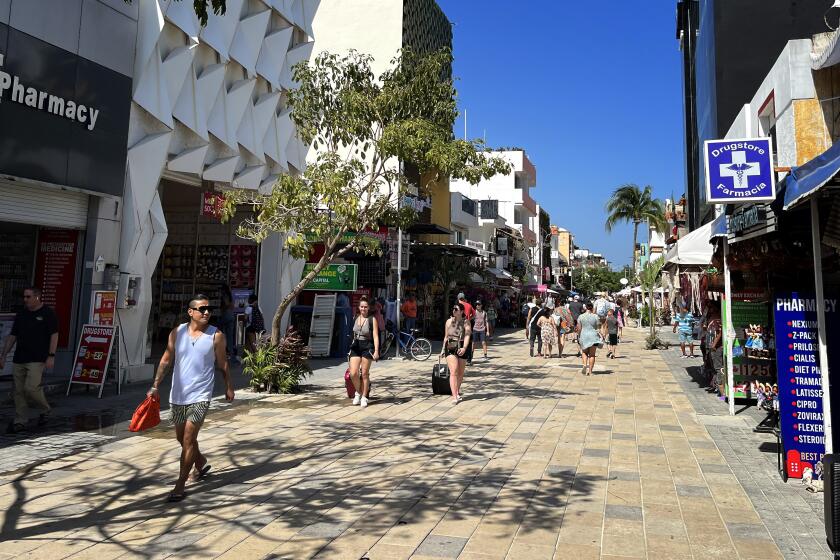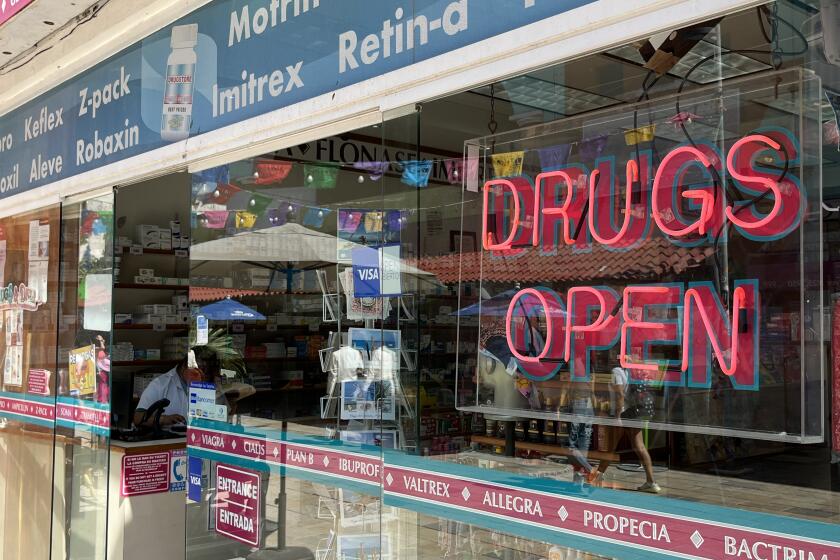Some Mexican pharmacies are selling full bottles of Adderall. But it’s actually meth.

PUERTO VALLARTA, Mexico — As a shortage of Adderall stretches into its second year, millions of patients are still struggling to fill their prescriptions in U.S. pharmacies. But in Mexico, some pharmacies are selling the pricey orange pills over the counter, in sealed bottles bearing the names and logos of well-known pharmaceutical companies.
One problem: They’re not real. Some are counterfeits made of methamphetamine, while others contain appetite suppressants, acetaminophen or caffeine.
Ten months after the Los Angeles Times sounded the alarm about methamphetamine-tainted Adderall appearing in Mexican pharmacies, a follow-up investigation shows the problem is more sophisticated than previously known.
A new round of testing in Cabo San Lucas and Puerto Vallarta found that counterfeiters in both beachfront cities are now passing off a wider array of substances as attention deficit/hyperactivity disorder medications and selling the pills not only as Adderall but sometimes as a similar medication called Vyvanse.
And, instead of just selling loose tablets one at a time, dozens of drug stores are offering painstakingly counterfeited bottles, complete with drug identification codes, lot numbers and sometimes even holographic anti-tamper seals. In some cases, identical bottles were found in multiple stores or regional chains.
“It’s really bad to find out that pharmacies are selling whole bottles of fake medication, and clearly an effort has been made to make them look legitimate,” said Chelsea Shover, a UCLA researcher who published a study on counterfeit medications in Mexico earlier this year.
“There was some sense before that maybe the problem was largely confined to single pills, but clearly that’s not the case,” Shover said. “It sounds like the problem of counterfeit medications is a lot more widespread than we would have thought.”
Healthcare providers called the shift “very concerning,” and drug market experts said the sophistication of the faux bottles points to the involvement of large criminal organizations.
“This is clearly escalating, increasing the quality of the fakes,” said Vanda Felbab-Brown, a senior fellow at the Brookings Institution who studies organized crime. “That also suggests a systematic component — like the cartels. You wouldn’t have this consistency in the packaging if you didn’t have a big actor behind it.”
Drug regulators in Mexico did not respond to requests for comment, although in recent months officials have cracked down with raids and seizures in multiple cities.
****
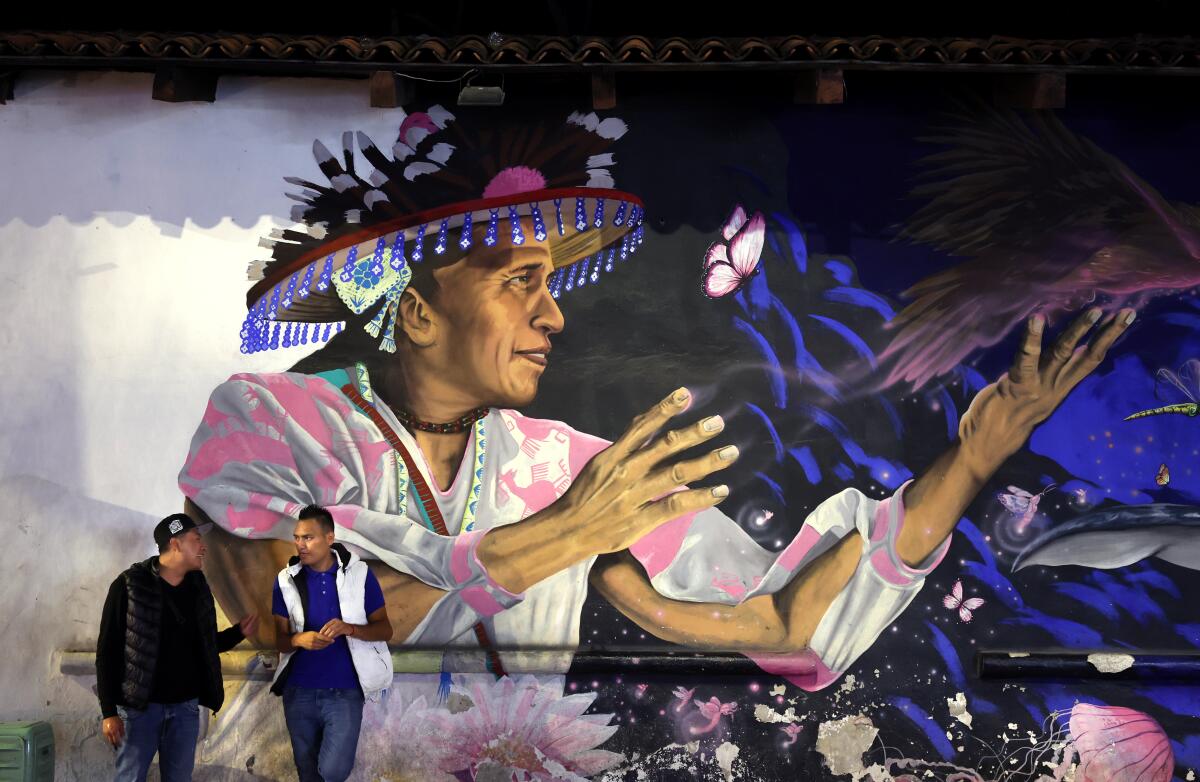
Pharmacies in Mexico have long been known for selling a wide range of medications over the counter, many of which, in the United States, either require a prescription or are simply not available. But the official list of substances that can be legally prescribed in Mexico does not include Adderall — which makes it a prime target for counterfeiters catering to American travelers who can no longer get their medication at home.
The Times first began investigating counterfeit medications in January, when reporters traveled to Tijuana and Los Cabos and purchased loose pills over the counter from several brick-and-mortar drugstores.
They found some of the pills sold as opioid painkillers were actually fentanyl, and all of the pills sold as Adderall were actually methamphetamine. Overall, the Times investigation found that 71% of the 17 pills tested came up positive for more powerful drugs. So reporters expanded the investigation to other border towns and tourist destinations, using at-home testing strips followed by confirmatory lab tests to determine the pills’ contents.
New testing by Times reporters has revealed that some pharmacies in cities across Mexico sell counterfeit medication tainted with fentanyl and methamphetamine.
By June, the Times team had bought and tested more than 50 pills from 29 pharmacies in eight cities, finding counterfeits for sale in stores from coast to coast, mostly in areas that attract travelers. While more than a third of the painkillers tested were fake, an even higher fraction — roughly 80% — of the pills sold as Adderall were counterfeit.
During initial rounds of testing in the first half of the year, most of the 15 Adderall samples purchased were sold over the counter as single pills. Many bore a strong resemblance to the orange, circular tablets commonly sold as Adderall in U.S. pharmacies, though a few came in large capsules typically used for antibiotics.
Twelve of the pills tested positive for substances that are not found in legitimate Adderall, including methamphetamine, caffeine, acetaminophen and MDMA — more commonly known as ecstasy.
Following the investigation, authorities in Mexico raided pharmacies in several areas where reporters and researchers had documented the problem. Government agents shut down dozens of pharmacies in the Yucatán Peninsula and Los Cabos over the spring and summer. Then in late November, authorities shuttered 31 stores in Ensenada, a Baja California port city roughly 50 miles south of Tijuana.

But this fall, a follow-up investigation by The Times at two of the tourist hotspots reporters visited previously found that pharmacies were still selling counterfeit medications. In Puerto Vallarta and Cabo San Lucas, none of the 15 pills sold as Adderall in November contained either of the medication’s active ingredients, dextroamphetamine and amphetamine.
Instead, 13 contained methamphetamine — a drug that is closely related, but stronger. Some of the orange pills also contained other drugs such as acetaminophen or caffeine. In two cases, the alleged Adderall instead came in green capsules that contained clobenzorex, a weaker stimulant sold in Mexico as an appetite suppressant.
Mexican authorities raided pharmacies in tourism hot spots, seizing medications and shuttering drug stores. The operation comes on the heels of a sweeping Times investigation.
Though some stores offered the pills individually, most sold them in sealed bottles. In Cabo San Lucas, the bottles varied in appearance from one store to the next. They all bore the names of major pharmaceutical companies — though often there were spelling, printing or translation errors, telltale signs of counterfeiting.
In Puerto Vallarta, several stores and at least two regional chains offered identical bottles: wider ones bearing a Teva Pharmaceutical Industries label, and taller ones with a Sun Pharmaceutical Industries label. The bottles typically had expiration dates, lot numbers, bar codes and drug identification numbers.
But the most elaborate counterfeit was a bottle of fake Vyvanse sold in Puerto Vallarta. Unlike Adderall, the medication has been legally available by prescription in Mexico — and last year health officials there put out a vague warning about counterfeit versions appearing on the market. Crucially, the warning did not say what the counterfeit pills actually contained.
When reporters visited a small chain called Súper Farmacias del Pueblo, one worker offered up a bottle of Vyvanse bearing the brand name Shire Pharmaceuticals for a little over $200. There were no obvious mistakes on the sealed bottle or the Spanish-language informational material that came with it.
And both items were enclosed in a neatly printed box with tamper-proof holographic stickers at the edges. The only red flag was the capsules themselves. Like regular 50-milligram Vyvanse, they were half-blue and half-white — but they didn’t have the “S489” and “50mg” imprints that appear on the legitimate medication.
Takeda Pharmaceutical Company, which acquired Shire in 2019, said it has not sold Vyvanse in Mexico since 2021 and confirmed the lot number on the box was “not one associated” with the legitimate Takeda medication. The company said it could not comment on the rest of the packaging.
In response to questions from The Times, a Súper Farmacias del Pueblo representative said the chain planned to do an audit of its stores to make sure none of them were selling products not included in its catalog. In a follow-up message, the representative went on to accuse two other chains of selling unapproved medications.
Of the other drugmakers whose products were counterfeited, one — Sun Pharmaceuticals — did not offer comment. Teva confirmed that the company does not sell Adderall in Mexico and said it reported the suspicious pill bottles to health authorities there.
“Based on our review of these images, we believe that the pictured bottles are counterfeit and not produced by or on behalf of Teva,” spokesperson Yonatan Beker wrote in an email to The Times. “Teva takes counterfeiting of its products very seriously.”
****

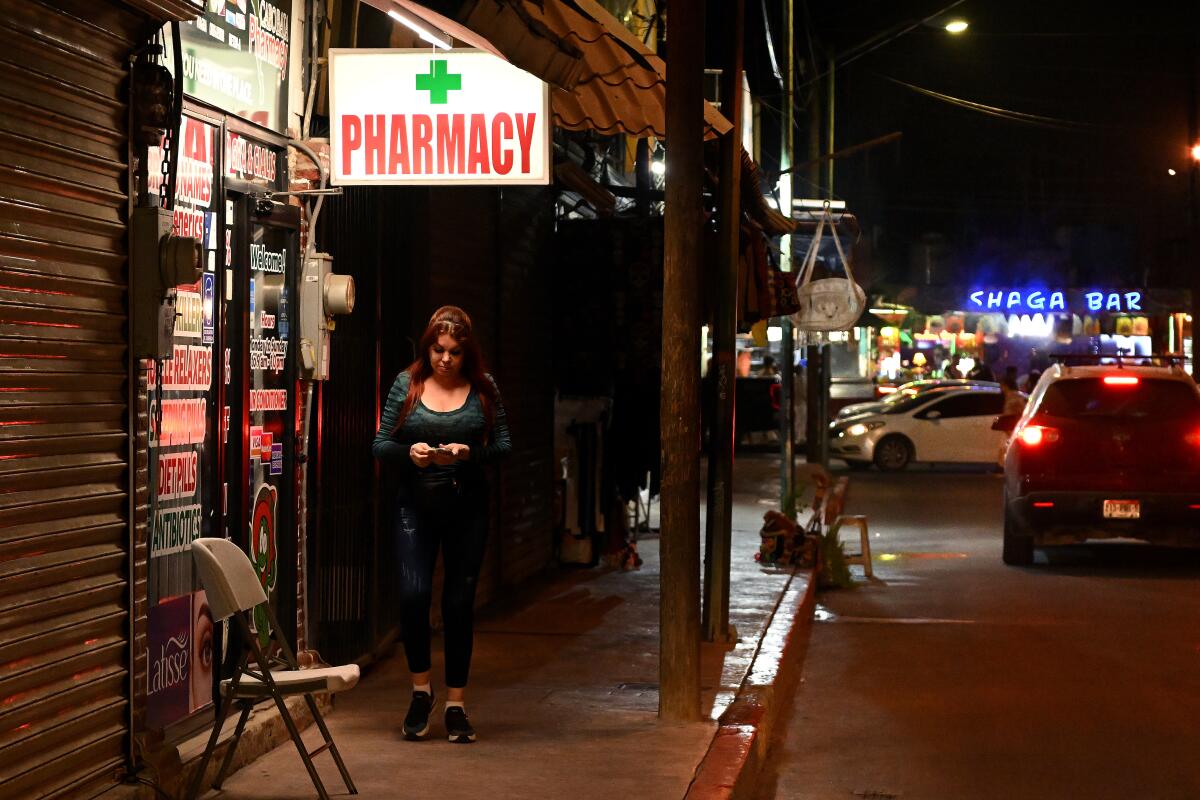
Tucked between massage parlors and bars on the curvy, sun-speckled roads of Cabo San Lucas and dotted along the hilly, bougainvillea-lined streets of Puerto Vallarta are dozens of drug stores that also take counterfeiting very seriously — or at least that’s what their workers say.
When reporters visited in November, clerks at several pharmacies stressed that their medications came from legitimate suppliers whose names they had forgotten. One said the pills came directly from a laboratory.
The drugstore closures in Ensenada come on the heels of a months-long investigation by The Times.
Pharmacies in both cities sold Adderall to one reporter and then denied carrying the illegal product just minutes later when a second set of reporters showed up with questions. At one drug store steps from the yacht-filled marina in Cabo San Lucas, a woman working behind the counter warned two reporters about fake ADHD pills at other stores in the area.
“In Mexico, they don’t make Adderall,” said the woman, who did not give her name. American buyers, she continued, should “be careful” when purchasing narcotics, even in bottles.
“You can tell from the presentation of the box or the bottle, you can tell that it’s not real,” she said. “Or we can tell, because they’re Mexican brands. But you all [tourists] — how are you going to tell?”
That warning came hours after another reporter purchased Adderall from that same pharmacy, where a different worker had asserted the pill was safe because it had come directly from California. Lab testing later showed it contained acetaminophen and methamphetamine.
Though unwittingly taking a methamphetamine pill may not necessarily carry the same immediate risk of death as accidentally consuming fentanyl, drug experts say there are still significant concerns — such as failing a drug test, accidentally running afoul of the law or having unanticipated effects.
“Meth is a stronger stimulant than Adderall, and that can mean it lasts longer or has more pronounced effects than what some would be expecting,” said Shover, the UCLA researcher. “Crucially, with the chronic use of meth there are long-term cardiovascular issues.”
****
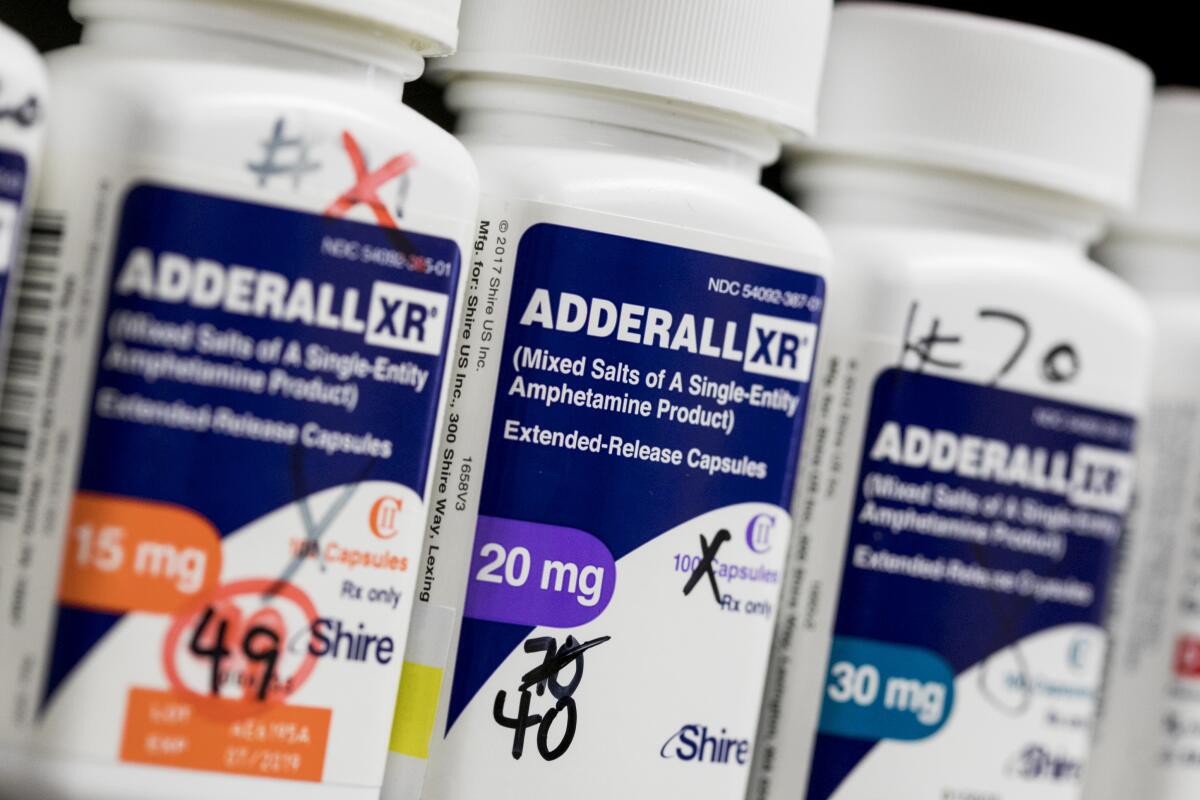
It is difficult to know how much the recent scarcity of ADHD medication in the U.S. has pushed people toward methamphetamine-tainted prescriptions in Mexico, although drug experts say it’s a foreseeable outcome.
“Cutting off prescriptions gets more people using meth,” said Dr. Ryan Marino, a toxicology expert at Case Western Reserve University School of Medicine. “Making more things inaccessible increases the revenue to cartels. It’s predictable.”
When the FDA acknowledged an Adderall shortage in October 2022, federal officials blamed it on “manufacturing delays” at Teva, one of the major suppliers of the drug. Eventually, the shortage spread to other companies and to other stimulant medications, including Ritalin and Vyvanse.
The U.S. Drug Enforcement Administration sets annual quotas limiting the amount of raw materials each company can have to make certain controlled drugs. According to the agency, pharmaceutical companies weren’t making as many doses of ADHD medications as they could. But several drugmakers said they were — and that they’d even asked the DEA for permission to make more.
“At the end of the day, the fact that this shortage lasted so long without any intervention, that falls on the DEA,” Marino said. “They’re the ones that had the power to change that — especially when other companies were offering to step up and increase their manufacturing.”
The DEA did not respond to a request for comment.
This year, at least one company — Ascent Pharmaceuticals — took the matter to court, filing a motion accusing the DEA of slow-walking and then denying its request to get the raw materials for making a variety of ADHD medications. The agency responded with filings accusing Ascent of major record-keeping violations that officials said justified denying the application altogether. The case is ongoing.
After nearly a year of complaints from increasingly desperate patients and the elected officials who represent them, in August the FDA and DEA addressed the shortage publicly by releasing an open letter to pharmaceutical companies, asking them to increase their production of stimulant ADHD medications.
A few months later, federal officials announced changes that could prevent similar medication shortages in the future and said 17 of the drug companies that produce ADHD medications have agreed to increase their output.
Now, several drug experts and healthcare providers said, the shortage appears to be waning.
****
Despite the concerning presence of fake medication in Mexico, not all stimulants appear to be affected. In several Mexican cities, about half a dozen samples of methylphenidate — commonly known in the U.S. by the brand names Ritalin and Concerta — did not reveal abnormalities.
That could be because the medication is readily available in Mexico through legal means, or simply because it comes in harder-to-fake blister packs.
And over the summer, lab testing on a small number of Adderall samples reporters collected from pharmacies in Tijuana found the pills contained the same ingredients as legitimate Adderall. Drug experts said that could mean the medications were smuggled from the U.S., where they are legally available by prescription.
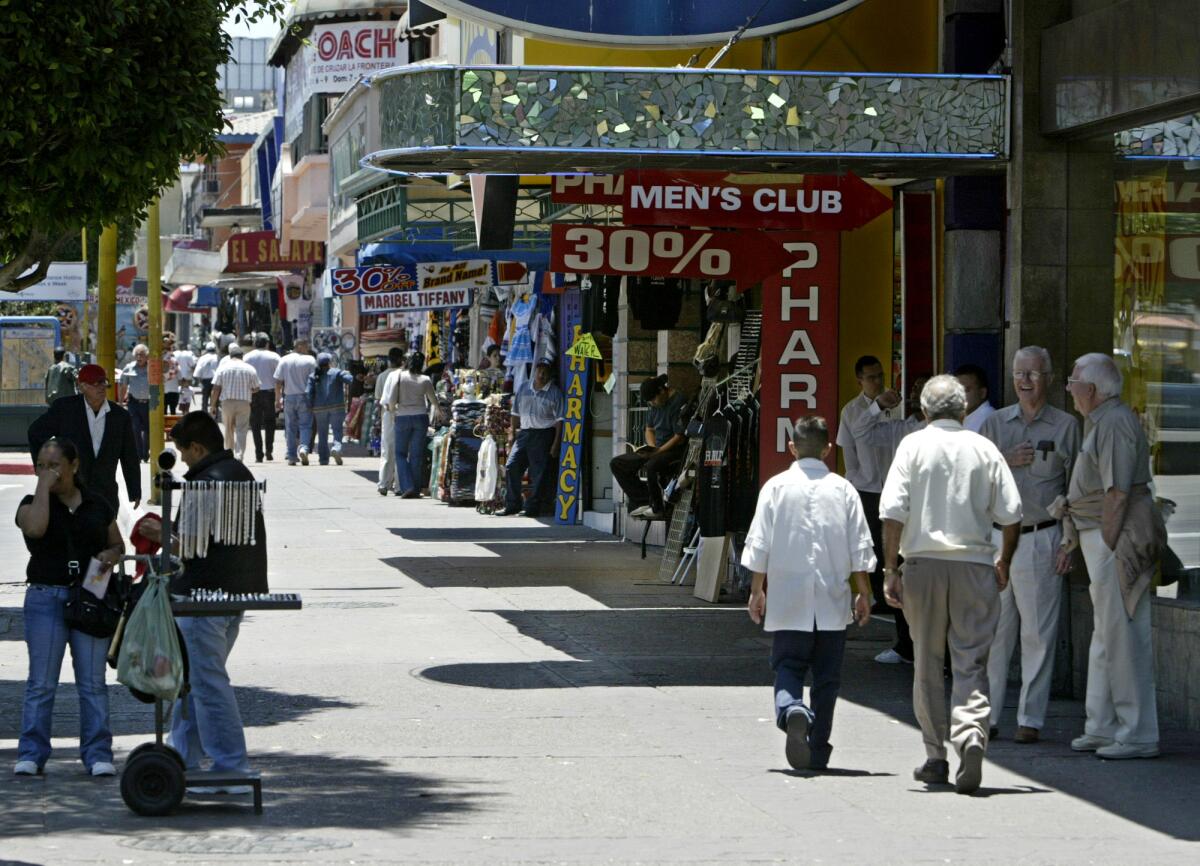
Still, to healthcare providers, the specter of drug stores selling methamphetamine-tainted medications is deeply concerning. Millions of children and adults are prescribed stimulants for either ADHD or narcolepsy, and shortages can derail their academic and professional careers.
“ADHD can also coexist with depression and anxiety, and the more severe cases can cause depression and anxiety,” said Linda Yoon, a licensed clinical social worker in Los Angeles who helps people manage ADHD. “I have definitely had clients who cannot get out of bed without their ADHD medication.”
If the shortage continues to ebb in the coming months, there may be less incentive for desperate patients to buy pills abroad — but some cartel and drug market experts are still concerned about what the future holds.
“One of the things that worries me is at what point criminal organizations will start putting pressure on legitimate industries,” said Felbab-Brown, pointing to her prior work examining the infiltration of criminal organizations into Mexico’s fishing industry.
“Are we going to have systematic pressure on the pharmaceutical industry and the packaging industry? It’s extraordinary what they’re doing now, and the public health dangers are clearly enormous.”
More to Read
Sign up for Essential California
The most important California stories and recommendations in your inbox every morning.
You may occasionally receive promotional content from the Los Angeles Times.

